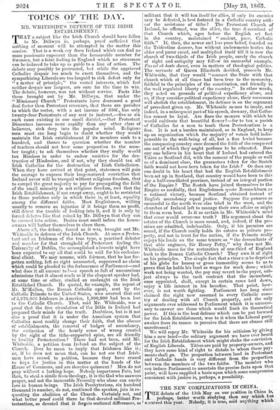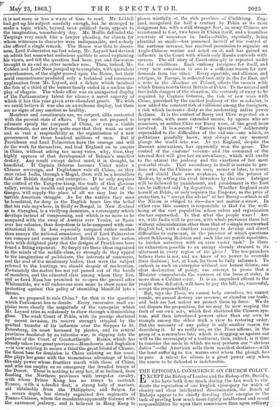THE NEW COMPLICATIONS IN CHINA. THE debate of the 15th
May on our pcsition in China is, perhaps, better worth studying than any which has omurred this year. Nobody, it is true, said anything which
it is not more or less a waste of time to read. Mr. Liddell had got up his subject carefully enough, but he managed to make a topic which, beyond most political facts, appeals to the imagination, unendurably dry. Mr. Beillie defended the Taepings very much like a lawyer pleading for clients for whom witnesses to character were indispensable, and nobody else offered a single remark. The House was thin to dreari- ness Lord Palmerston sat fast asleep, Mr. Layard had devised an adroit but somewhat audacious quibble to avoid explaining his views, and till the question had been put and discussion brought to an end no other member rose. Then, indeed, Mr. Cobden and Lord Naas jumped up to complain with querulous powerlessness, of the slight passed upon the House, but their acrid remonstrance produced only a technical and erroneous explanation from Mr. Layard, and a debate which involved the fate of a third of the human family ended in a useless dis- play of chagrin. The whole affair was an unexpected display of the Parliamentary talent for silence, a novel capacity of which it has this year given over-abundant proofs. We wish we could believe it was also an unwelcome display, but there are no signs of any emotion so healthy.
Members and constituents are, we suspect, alike contented with the present state of affairs. They are not prepared to advocate openly the conquest of China, or even a visible Protectorate, nor are they quite sure that they want so new and so vast a responsibility as the organization of a new government for three hundred millions of men. But if Providence and Lord Palmerston have the courage and will do the work for themselves, and lead England on to empire in China, without asking too many votes, why, then, they highly approve of that development of Britain's manifest destiny. Any result except defeat must, it is thought, be beneficial. If Captain Osborne becomes Vizier under a Chinese sovereign, and Englishmen rule all China, as they once ruled India, through a Mogul, there will be a boundless field for British daring and enterprise. If he only acquires the control of the Yang-tse-kiang, the trade of that glorious valley, second in wealth and population only to that of the eanges, will supply the place of all we may lose in the terrible American struggle. As for the natives they must be benefitted, for deep in the English heart lies the belief that his rule anywhere, in Sicily or Bengal, in New Zealand as in Shanghai, is a vivifying dominion, a sovereignty which develops instead of compressing, and which is no more to be compared with the sway of Austria over Venice, or Spain over her colonies, than despotism is to be compared with con- stitutional life. In Asia especially conquest rather soothes than annoys the national conscience, and if Lord Palmerston can conquer and conquer without British taxes, the nation feels with delighted piety that the designs of Providence have found a fitting exponent. So deeply are these ideas engrained in the minds of the middle-class, so strongly do they appeal to the imagination of politicians, the interests of commerce, and the zeal of the missionary bodies, that were the subject referred to the hustings we should despair of moderation. Fortunately the matter has not yet passed out of the hands of members, and the educated class among whom they live, and as Lord Naas has promised to re-open the ground after Whitsuntide, we will endeavour once more to show cause for protesting against this policy of stumbling blindfold into a throne.
Are we prepared to rule China ? for that is the question which Parliament has to decide. Every successive mail ex- plains more clearly the magnitude of the enterprise which Mr. Layard tries so sedulously to show through a diminishing glass. The weak Court of Pekin, with its prestige shattered by recent invasion, its reserve strength crippled by the gradual transfer of its influence over the Steppes to St. Petersburg, its coast harassed by pirates, and its central provinces desolated by an intestine war, is slipping into the position of the Court of Constantinople. Russia, which has already taken two great provinces—Manchooria and Saghalien —is now striving to secure a third the great Island of Chusan, the finest base for dominion in China existing on her coast. She plays her game with the tremendous advantage of being the only power whose frontiers march with those of China, and who can employ on an emergency the dreaded troops of the Desert. There is nothing to stop her, if so inclined, from flooding the Northern provinces with irregular cavalry, with whom Prince Kung has no troops to contend. France, with a splendid fleet, a strong body of marines, aid obtainable from the Philippines, and Saigon for a secure depOt, has already organized five regiments of Franco-Chinese, whom the mandarins apparently distrust with the extremest jealousy, and is believed in Hong Kong to glance wistfully at the rich province of Cliehkiang. Eng- land, recognized for half a century by Pekin as its most dangerous foe, with a still stronger fleet, an army Chinese are accustomed to fear, two bases in China itself, and a boundless reservoir of resources in India—Sikhs, especially, being plentiful as snails—has possessed herself of the control of the customs revenue, has received permission to organize an Anglo-Chinese marine and acted on it, and has gained an influence in the Court with which only Russia contends with success. The old story of Constantinople is repeated under the old conditions. Each embassy intrigues for itself, and every new concession to one is a sufficient reason for new demands from the other. Every squabble, and alliance, and intrigue, in Europe, is reflected instantly in the far East, and a note in the Illoniteur on Poland, affects the success with which Russia resists Great Britain at Pekin. To the natural and inevitable dangers of the situation, the certainty of sway to be acquired by Captain Osborne, the risk of new wars with China, provoked by the excited jealousy of the mandarins, is now added the constant risk of collisions among the foreigners, a risk which increases daily as the moderating native power declines. It is the contest of Bussy and Clive repeated on a larger scale, with more extended means, by agents who are conscious, as neither Clive nor Bussy were, of the great issue involved. It is a second "Eastern Question," deliberately superadded to the difficulties of the old one—one which, as politicians painfully know, may always at any moment plunge the world into war. As yet England, despite the Russian annexations, has apparently won the game. The control of the customs' revenue and the command of the internal fleet will give her an ascendancy, which will excite to the utmost the jealousy and the exertions of her most powerful rivals. That ascendancy in itself is certain to pro- duce war, for the Chinese are sure, sooner or later, to resent it, and shield their own weakness, as did the princes of Madras, by setting the rival intruders by the ears. Intrigue will be followed by punishment, and punishment in the East can be inflicted only by deposition. Whether England seats herself at Pekin, or only requires the Emperor, as the price of protection, to "accept the advice" of her Envoy—which is all the Nizdm is obliged to do—does not matter a straw. In either ease this country is responsible to God for the well- being of the vast population whose rulers and organization she has superseded. Is that what the people want ? Are we, with India still to govern, with whole provinces there left without administration other than that of a single overworked English lad, with a limitless territory to develop and direct difficulties to surmount, in the presence of which questions about Schleswig Holstein and such like are parish squabbles, to burden ourselves with an even vaster task? Is there no exhaustion possible to an energy already strained to its uttermost in every region of the globe ? The ten-pouuders believe there is not, and we know of no power to override their decision ; but, at least, let them be fully informed. To. embark in such an enterprise without one honest debate, one clear declaration of policy, one attempt to prove that a Minister comprehends the vastness of the issue at stake, is more than a Cabinet error. It is an impudent affront to the people who, defeated, will have to pay the bill, or, successful, accept the responsibility. But, says the Times, we cannot help ourselves, we cannot recede, we cannot destroy our revenue, or abandon our trade, and both are lost unless we protect them by force. We do not dispute the proposition, for we may be now reaping the fruit of our own act., which first shattered the Chinese sys- tem, and then introduced powers other than our own to trample among the debris with a view to restoring order. But the necessity of any policy is only another reason for describing it. If we really are, as the Times affirms, in the grasp of a remorseless fate, which is dragging us against our will to the sovereignty of a continent, then, indeed, is it time to consider the mode in which we may perform our "obvious duties "—the American calls them manifest destinies—with the least suffeing to the worms over whom the plough has to pass. A talent for silence is a great power only when the course to be defended is indefensible.































 Previous page
Previous page